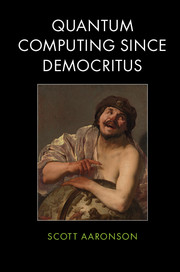Book contents
- Frontmatter
- Dedication
- Contents
- Preface
- Acknowledgments
- 1 Atoms and the void
- 2 Sets
- 3 Gödel, Turing, and friends
- 4 Minds and machines
- 5 Paleocomplexity
- 6 P, NP, and friends
- 7 Randomness
- 8 Crypto
- 9 Quantum
- 10 Quantum computing
- 11 Penrose
- 12 Decoherence and hidden variables
- 13 Proofs
- 14 How big are quantum states?
- 15 Skepticism of quantum computing
- 16 Learning
- 17 Interactive proofs, circuit lower bounds, and more
- 18 Fun with the Anthropic Principle1
- 19 Free will
- 20 Time travel
- 21 Cosmology and complexity
- 22 Ask me anything
- Index
- References
22 - Ask me anything
Published online by Cambridge University Press: 05 April 2013
- Frontmatter
- Dedication
- Contents
- Preface
- Acknowledgments
- 1 Atoms and the void
- 2 Sets
- 3 Gödel, Turing, and friends
- 4 Minds and machines
- 5 Paleocomplexity
- 6 P, NP, and friends
- 7 Randomness
- 8 Crypto
- 9 Quantum
- 10 Quantum computing
- 11 Penrose
- 12 Decoherence and hidden variables
- 13 Proofs
- 14 How big are quantum states?
- 15 Skepticism of quantum computing
- 16 Learning
- 17 Interactive proofs, circuit lower bounds, and more
- 18 Fun with the Anthropic Principle1
- 19 Free will
- 20 Time travel
- 21 Cosmology and complexity
- 22 Ask me anything
- Index
- References
Summary
To remind you, this book is based on a course I taught in 2006. On the last day of class, I followed the great tradition pioneered by Richard Feynman, in which the last class should be one where you can ask the teacher anything. Feynman's rule was that you could ask about anything except politics, religion, or the final exam. In my case, there was no final exam, and I didn't even make politics or religion off-limits. This chapter collects some of the questions people asked me, together with my responses.
Student: Do you often think about using computer science to limit or give us a hint about physical theories? Do you think that we'll be able to discover physical theories which give more powerful models than quantum computation?
Scott: Is BQP the end of the road, or is there more to be found? That's a fantastic question, and I wish more people would think about it. I’m being a bit of a politician here and not answering directly, because obviously the answer is “I don't know.” I guess the whole idea with science is that if we don't know the answer, we don't try to sprout one out of our butt or something. We try to base our answers on something. So, everything we know is consistent with the idea that quantum computing is the end of the road. Greg Kuperberg had an analogy I really liked. He said that there are people who keep saying that we've gone from classical to quantum mechanics so what other surprises are in store? But maybe that's like first assuming the Earth is flat, and then on discovering that it's round, saying who knows, maybe it has the topology of a Klein bottle. There's a surprise in a given direction, but once you've assimilated it, there may not be any further surprise in that same direction.
- Type
- Chapter
- Information
- Quantum Computing since Democritus , pp. 343 - 362Publisher: Cambridge University PressPrint publication year: 2013
References
- 1
- Cited by



